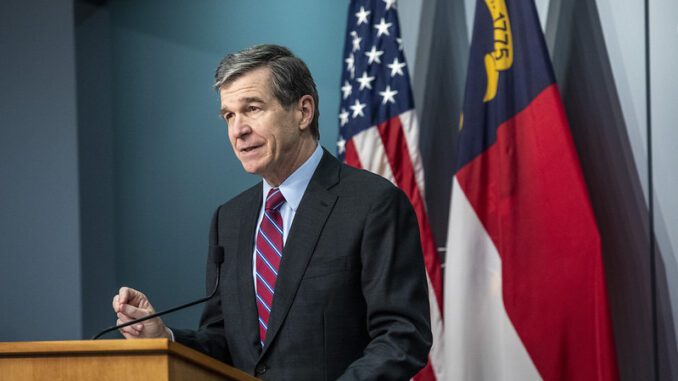
RALEIGH — Democratic Gov. Roy Cooper has vetoed six bills since the middle of June, raising his already record-breaking total to 83.
Cooper’s predecessors issued a combined total of 35 vetoes. His vetoes now account for 70% of all vetoes issued by North Carolina governors since the office was given that power in the mid-1990s. Cooper took office in January 2017.
The governor’s most recent vetoes came on June 23 and included Senate Bill 582, the North Carolina Farm Act of 2023, and House Bill 750, Address ESG Factors.
“The provision in this bill that severely weakens protection for wetlands means more severe flooding for homes, roads and businesses and dirtier water for our people, particularly in eastern North Carolina,” Cooper said in his veto message of the 2023 Farm Act. “This provision coupled with the drastic weakening of federal rules caused by the U.S. Supreme Court’s recent decision in the Sackett case, leaves approximately 2.5 million acres, or about one half of our state’s wetlands, unprotected.”
Cooper’s veto message went on to say “The General Assembly has allocated tens of millions of dollars to protect the state from flooding and my administration is working to stop pollution like PFAS and other contaminants. This bill reverses our progress and leaves the state vulnerable without vital flood mitigation and water purification tools.”
Senate Agriculture, Energy, and Environment Committee Chairman Brent Jackson (R-Sampson) issued a statement criticizing the governor’s veto of this year’s farm bill and noted it had “strong bipartisan support.”
The Farm Act of 2023 passed the House 77-38 with eight Democrats signing on. The Senate’s concurrence vote was 37-6, including nine Democrats voting in favor.
The Senate swiftly overrode the veto on June 26 by a vote of 26-17. The nine Democrats who had previously voted in favor of the bill reversed their votes to uphold the governor’s veto.
In a post-override statement, Jackson called out those Democrats who changed their votes.
“North Carolina Farmers work day-in-day-out to make sure we all have enough food to feed our families, and it’s a shame that after originally supporting the 2023 Farm Act, several Democrats turned their back on farmers,” Jackson said.
Cooper’s veto message of House Bill 750 reads, “This bill does exactly what it claims to stop. For political reasons only, it unnecessarily limits the Treasurer’s ability to make decisions based on the best interest of state retirees and the fiscal health of the retirement fund.”
State Treasurer Dale Folwell responded to the veto, stating “The legislature correctly passed a new law that protects retirees’ money from being used for Wall Street’s wacktivist political agenda.”
“This issue not only affects the pension plans, but also local budgets and the Banking Commission which I chair. As keepers of the public purse we are protecting and defending the state’s money from this politicization,” Folwell said, adding that he requests that the General Assembly “override this sadly misguided veto from Gov. Cooper.”
On June 21, the North Carolina Senate overrode all four of the vetoes issued by Cooper between June 16-19.
The overridden vetoes included Senate Bill 364, (Nondiscrimination and Dignity in State Work) which passed both chambers with veto-proof margins yet Cooper vetoed it on June 16, as well as three vetoes on June 19: Senate Bill 331 (Consumer Finance Act Amendments), Senate Bill 329 (Retail Installment Sales Act Amendments) and Senate Bill 299 (Reimburse Late Audit Costs with Sales Tax Rev.).
According to the House calendar, the vetoes overridden by the Senate will be taken up on June 27. The House has a veto-proof majority, so the overrides will likely be successful.
In his veto of Senate Bill 364, Cooper said, “In North Carolina, the diversity of our people is a strength. This legislation attempts to eliminate training that can help us understand the unconscious bias we all bring to our work and our communities.”
“Our state employees come from diverse backgrounds and we should be encouraging freedom of thought, instead of subjecting them to discriminatory trainings,” Sen. Warren Daniel (R-Burke), the primary sponsor of Senate Bill 364, said in a press statement. “This bill strikes the necessary balance between forbidding discrimination in our state workplaces and maintaining the First Amendment rights of our state employees.”
The veto message also alluded to comments made during a debate on the House floor by Reps. Keith Kidwell (R-Beaufort) and Jeff McNeely (R-Iredell).
In response to Rep. Diamond Staton-Williams invoking her “belief in the power of God” and that she was a regular churchgoer during the debate on the state’s abortion laws, Kidwell remarked to staffers at the back of the chamber that she must have meant to the church of Satan.
McNeely’s remark came during debate over expanding school choice scholarships to all families in the state. He had started to ask Rep. Abe Jones (D-Wake) whether or not Jones being black and an athlete helped him get into Harvard. McNeely later apologized to Jones on the House floor.
Senate Bill 364 prohibits compelled speech and affirmation of ideological beliefs in state hiring and workplace training.
Both 331 and 229 passed the legislature with unanimous support from both parties. In the veto override vote of those bills, nearly every Democrat who voted to pass the measures flipped their vote in order to uphold the governor’s veto.
Senate Bill 331 deals with payday loan regulations. The bill increases licensing fees paid by payday lending outfits and also slightly increases the interest rate they charge for the loans.
Senate Bill 299 strengthens penalties for local governments for failing to file audited financial reports in a timely manner.
“After voting to support these bills, Democrats have decided that loyalty to their party leader is more important than good policy. At the end of the day, Democrats have a constituency of one — Roy Cooper,” Sen. Jim Perry (R-Lenoir), the primary sponsor of Senate Bills 329 and 331, said in a press statement.
Folwell, a Republican, and State Auditor Beth Wood, a Democrat, issued a joint statement urging the legislature to override the veto of 299. Both Folwell and Wood sit on the state’s Local Government Commission charged with overseeing the health and stability of local governments and municipalities across the state.
“Local governments that neglect to conduct annual audits should not be let off the hook and given a slap on the wrist,” Sen. Lisa Barnes (R-Nash), the primary sponsor of Senate Bill 299, said in a press statement. “Residents need to know how their local officials are spending their hard-earned tax dollars. It’s a shame that Gov. Cooper vetoed a bill that supports good governance and provides transparency to our residents.”
Senate Bill 329 also passed with some Democratic support. That bill makes a small increase to the finance charge rates applied to certain consumer credit installment sale contracts for items from 21% to 24%. It also has a slight increase for contracts involving cars and raises the late fee on contracts by $3, going from $15 to $18 for past-due accounts.
Four bills have become law this session without the governor’s signature after Cooper refused to sign them, the most recent being House Bill 130, titled Energy Choice/Solar Decommissioning Requirements. The bill requires owners of utility-scale solar projects to set aside funds and responsibly decommission their projects once completed. The bill also blocks cities from creating ordinances that “prohibits connection, reconnection, modification, or expansion” on energy sources or services delivered to homeowners and businesses.
Since the start of June, the governor has also signed 22 bills into law.



